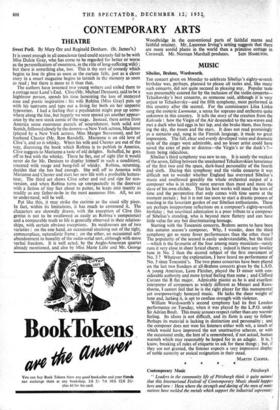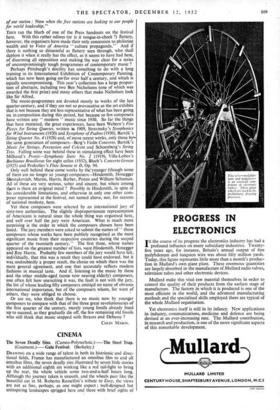" Leaders in the community life of Pittsburgh think it
quite natural that this International Festival of Contemporary Music should happen here and now : Here where the strength and daring of the men of many nations have melded the metals which support the industrial supremacy of our nation : Now when the free nations are looking to our people for world leadership."
Thus ran the blurb of one of the Press handouts on the festival here. With this rather odious (or is it tongue-in-cheek ?) flattery, however, the organisers have made their only concession to philistine wealth and to Voice of America " culture propaganda." And if there is nothing so distasteful as flattery seen through, who shall deplore it when it really has the effect, as it seems to have had here, of disarming all opposition and making the way clear for a series of uncompromisingly tough programmes of contemporary music ?
Perhaps Pittsburgh's docility has something to do with a long training in its International Exhibition of Contemporary Painting, Which has now been going onwfor over half a century, and which is equally uncompromising. This year's collection has a large propor- tion of abstracts, including two Ben Nicholsons (one of which was awarded the first prize) and many others that make Nicholson look like Sir Alfred.
The music-programmes are devoted mostly to works of the last quarter-century, and if they are not so provocative as the art exhibits that is not because they are less representative of what has been going on in composition during this period, but because so few composers have written any " modern " music since 1930. So far the things that have mattered, the great experiences, have been Webern's Five Pieces for String Quartet, written in 1909, Stravinsky's Symphonies for Wind Instruments (1920) and Symphony of Psalms (1930), Bartok's String Quartet No. 4 (1928) and, of more recent works, only those by' the same generation of composers—Berg's Violin Concerto, Bartok's Music for Strings, Percussion and Celesta and Schoenberg's String Trio. Falling some way behind these in stimulating effect have been Milhaud's Protee—Symphonic Suite No. 2 (1919), Villa-Lobos's Bachianas Brasilieras for eight cellos (1932), Bloch's Concerto Grosso (1925) and Prokofiev's Flute Sonata in D, Op. 94. Only well behind these come works by the-younger (though some of them are no longer so young) composers—Hindemith, Honegger Shostakovich, Martin, Harris, Barber, Piston and William Schuman. All of these are very serious, sober and sincere, but where among them is there an original mind ? Possibly in Hindemith, in spite of his considerable limitations, and otherwise in only one other com- poser represented at the festival, not named above, nor, for reasons of national modesty, here. Yet these composers were selected by an international jury of sixty-two authorities. The slightly disproportionate representation of Americans is natural since the whole thing was organised here, and well over half the jury were American. What is much more surprising is the order in which the composers chosen have been listed. The jury ,members were asked to submit the names of " those composers whose works have been publicly recognised as the most significant music from their respective countries during the second quarter of the twentieth century." The first three, whose names appeared on the greatest number of lists, were Hindemith, Honegger and goy Harris. Probably few members of the jury would have felt, individually, that this was a result they could have endorsed, but it wag, undoubtedly a proper result, the choice on which there was the most general agreement, and one that accurately reflects modern -fashions in musical taste. And if, listening to the music by these and the other middle-aged (some now nearing elderly) composers, one often felt how unexciting it was, the fault is not with the jury, the list of whose leading fifty composers omitted no name of obvious international importance, but of the composers whom, for want of others, they were obliged to choose.
Or are we, who think that there is no music now by younger composers to compare with that of the three great revolutionaries of the first quarter of the century, merely young fossils already lined up to succeed, as they gradually die off, the few remaining old fossils who still think that music stopped with Strauss and Debussy ?
COLIN MASON.



































 Previous page
Previous page